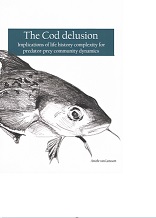
Anieke van Leeuwen
Deze bladzijde is gemaakt ter voorbereiding op een boek over 'Schrijvende Veenendalers'. De informatie op deze bladzijde is verre van volledig. Heeft u aanvullingen of verbeteringen? Mailt u die dan naar matsbeek@ziggo.nl. Bij voorbaat dank!Profiel
Achternaam: van Leeuwen
Voornaam: Anieke
Geboren: 10-11-1980
Te: Ede (ziekenhuis)
Pseudoniem(en):
Werk
Overige non-fictie

- The Cod Delusion; implications of life history complexity for predator-prey community dynamics (proefschrift) (2012)
Opmerkingen
- Anieke van Leeuwen werd geboren in het ziekenhuis in Ede.
- Ze groeide op in Veenendaal, waar het gezin eerst op Stationssingel 4 en later op Zandstraat 58 woonde.
- Anieke van Leeuwen ging naar de Vrije School in Ede en daarna naar de Vrije School Zeist (middelbaar onderwijs).
- Ze studeerde biologie op de Universiteit van Amsterdam en is daar gepromoveerd aan de faculteit der Natuurwetenschappen, Wiskunde en Informatica.
- Sinds januari 2013 is ze als onderzoeker verbonden aan de Princeton University in New Jersey, Amerika.
Anderen over Anieke van Leeuwen
- As theoretical ecologist, Anieke is fascinated by the complexity of ecosystems and community dynamics. The question of what processes structure ecosystems, is at the core of her research. Anieke studies how accounting for population structure and for differences between individual characteristics affects ecosystem processes. The effect of human interference with ecosystems is another part of her research interests. Human interference with ecological processes often shapes a dominant interaction in communities be it the impact of fisheries on top-predator species or the large-scale deforestations in agricultural areas. Such interference has direct as well as indirect effects, often visible at many different trophic levels. Anieke’s research focuses on the causes of population collapses, lack of species recoveries, and regime shifts. For this focus a mechanistic approach is used, to understand the processes underlying observed patterns, and leading to explanations of emerging population and community dynamics. Anieke makes use of physiologically structured population models and stage-structured biomass models, and both numerical and analytical techniques for analysis. (http://www.princeton.edu/~dobber/People.html)
Links
- Artikel van Anieke van Leeuwen in NRC (10-12-2014)
